The European Union (EU) has about 40 free trade deals, covering more than 70 countries. That means the UK, as a member of the EU, can currently trade with countries like Canada without having to pay taxes on its imports (tariffs) of most goods.
If the UK leaves the EU with no deal, it would automatically lose tariff-free access to these markets and it would have to trade under World Trade Organization (WTO) rules.
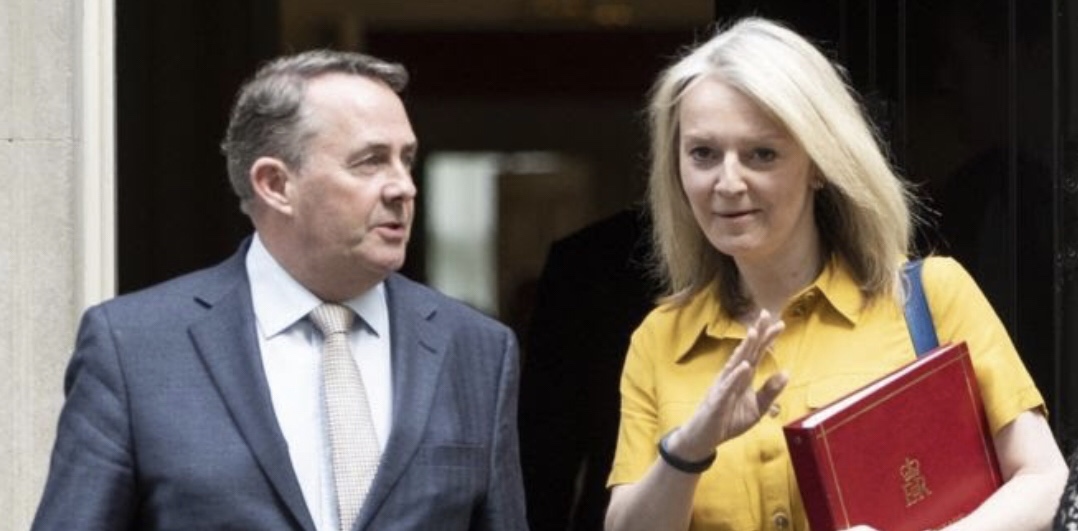
To avoid this scenario, the UK government is in the process of rolling over the EU’s existing free trade deals with other countries.
If Brexit happens, the UK will be free to negotiate and sign new trade deals with countries where the EU has no such agreement – like the US. However, the UK will also need to negotiate a free trade deal with the EU to ensure continued tariff-free access to its market after the transition period (which is due to end on 31 December 2020).
How many deals have been rolled over?
So far, the UK has signed 19 “continuity” deals covering 49 countries or territories:
▪ Jordan (signed 14 November)
▪ Morocco (26 October)
▪ Georgia (21 October)
▪ Southern African nations (9 October)
▪ Tunisia (4 October)
▪ Lebanon (19 September)
▪ South Korea (22 August)
▪ Central America (18 July)
▪ Andean countries (15 May)
▪ Norway and Iceland (2 April)
▪ Caribbean countries (22 March)
▪ Pacific Islands (14 March)
▪ Liechtenstein (28 February)
▪ Israel (18 February)
▪ Palestinian Authority (18 February)
▪ Switzerland (11 February)
▪ The Faroe Islands (1 February)
▪ Eastern and Southern Africa (31 January)
▪ Chile (30 January)
Which deals won’t be rolled over?
The UK government has previously said some deals are unlikely to be rolled over by exit day. San Marino, Andorra and Turkey won’t be ready because these countries are already in a customs union with the EU. A deal with Japan – which is worth just over 2% of total UK trade – also won’t be ready.
How much are these trade deals worth?
Last year, the total value of UK trade (goods and services) was £1.3tn. About 11% of this trade came from countries with EU trade agreements.
The 19 trade agreements the UK has reached represent just over 8% of total UK trade. That means the UK has so far rolled over about three-quarters of the EU’s trade deals.
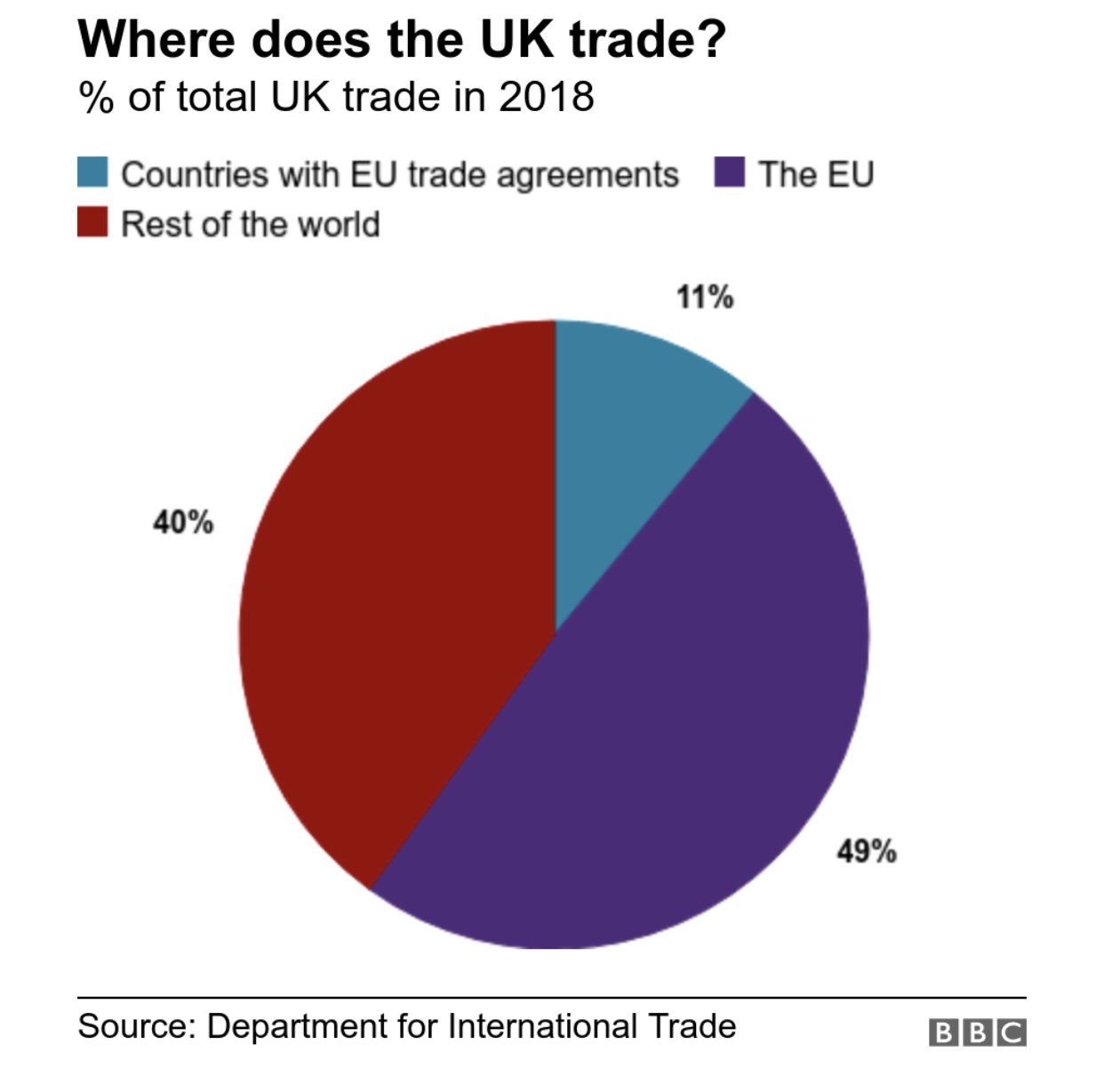
Jordan
The agreement with Jordan was reached on 14 November. Total trade between the UK and Jordan was worth £448m in 2018.
Morocco
The UK’s deal with Morocco was signed on 26 October. Trade between the two countries was worth £2.5bn in 2018.
Georgia
The UK signed an agreement with Georgia on 21 October. Trade between the two countries was worth £123m in 2018.
Southern Africa customs union and Mozambique
The UK signed a continuity deal with six African nations – South Africa, Botswana, Lesotho, Namibia, Eswatini (formerly Swaziland) and Mozambique – on 9 October.
Trade between the UK and these six countries was worth £10.2bn in 2018.
Tunisia
Signed on 4 October, the government says UK consumers will continue to benefit from from lower textile and clothing prices following the agreement.
Trade between the UK and Tunisia was worth £542m in 2018.
Lebanon
The deal with Lebanon was signed on 19 September. Total trade between the UK and Lebanon was worth £762m in 2018.
South Korea
Signed on 22 August, the South Korea agreement is the first to be struck in Asia.
Last year, total trade between the UK and South Korea was worth £14.8bn.
Central America
Six Central American countries (Costa Rica, El Salvador, Guatemala, Honduras, Nicaragua and Panama) signed the UK-Central America Association Agreement on 18 July.
The government says the deal means UK consumers will continue to benefit from lower prices on goods such as prawns and fruit.
Total trade between the UK and Central America was worth £1.1bn in 2018.
Andean countries
Colombia, Ecuador and Peru are the countries covered by the Andean agreement, signed on 15 May.
Total trade between the UK and the Andean countries was worth £3.4bn in 2018.
Norway and Iceland
The agreement, signed on 2 April, maintains the same level of tariffs on goods traded between the UK, Iceland and Norway.
The government says UK businesses will continue to benefit from lower import prices, such as aluminium and some fuel and oil products.
Total trade between the UK and Norway-Iceland was £30.6bn in 2018.
Caribbean countries
The deal with the Caribbean states (known as the Cariforum) covers 12 countries, including Barbados and Jamaica, and was signed on 22 March.
A further two countries, the Bahamas and the Republic of Suriname, have agreed to the deal in principle and are “expected to sign shortly”.
Exporters of rum, bananas and sugar cane are all expected to benefit from the arrangement.
Total trade between the UK and the region was worth around £3.7bn in 2018.
Pacific Islands
The deal with the Pacific Islands – covering Fiji and Papua New Guinea – was signed on 14 March.
The UK says the deal will maintain access to goods such as fish and sugar.
In 2018, total trade between the UK and the region was worth around £163m.
Israel
The deal was formally signed on 18 February. The government says the agreement could save the UK vehicle industry up to £9m a year in tariff charges.
Total trade between the UK and Israel was worth £4.2bn in 2017.
Palestinian Authority
The UK-Palestinian Authority agreement was signed on 18 February.
The UK government says the deal will benefit Palestinian exporters of fruit, nuts and olive oil.
Total trade between the two was £41m in 2018.
Switzerland
The UK-Switzerland agreement was confirmed in Bern on 11 February.
Without the deal, the UK government says the motor industry could have faced up to £8m in tariff charges, while aluminium exporters could have faced up to £4m.
Trade between the UK and Switzerland was worth £32.4bn in 2018 – accounting for about 2.5% of total UK trade.
An additional agreement, which applies the main parts of the Swiss-UK deal to Liechtenstein, was also signed.
The Faroe Islands
The Faroe Islands is the UK’s 114th largest trading partner , according to the government. Total trade between the two countries was worth £252m in 2018.
The UK government says that the agreement will mean fish prices won’t rise as a result of tariffs.
Eastern and Southern Africa
Trade between the Eastern and Southern Africa region was worth £2bn in 2018. The deal covers Madagascar, Mauritius, Seychelles and Zimbabwe.
Meat and fish are the main goods imported from the region by the UK.
Chile
The UK-Chile trade arrangement was the first agreement to be signed. Total trade was £2bn last year.
Fruit, nuts and drinks are the top goods imported by the UK. The government says the deal will help to protect parts of the UK’s wine industry.
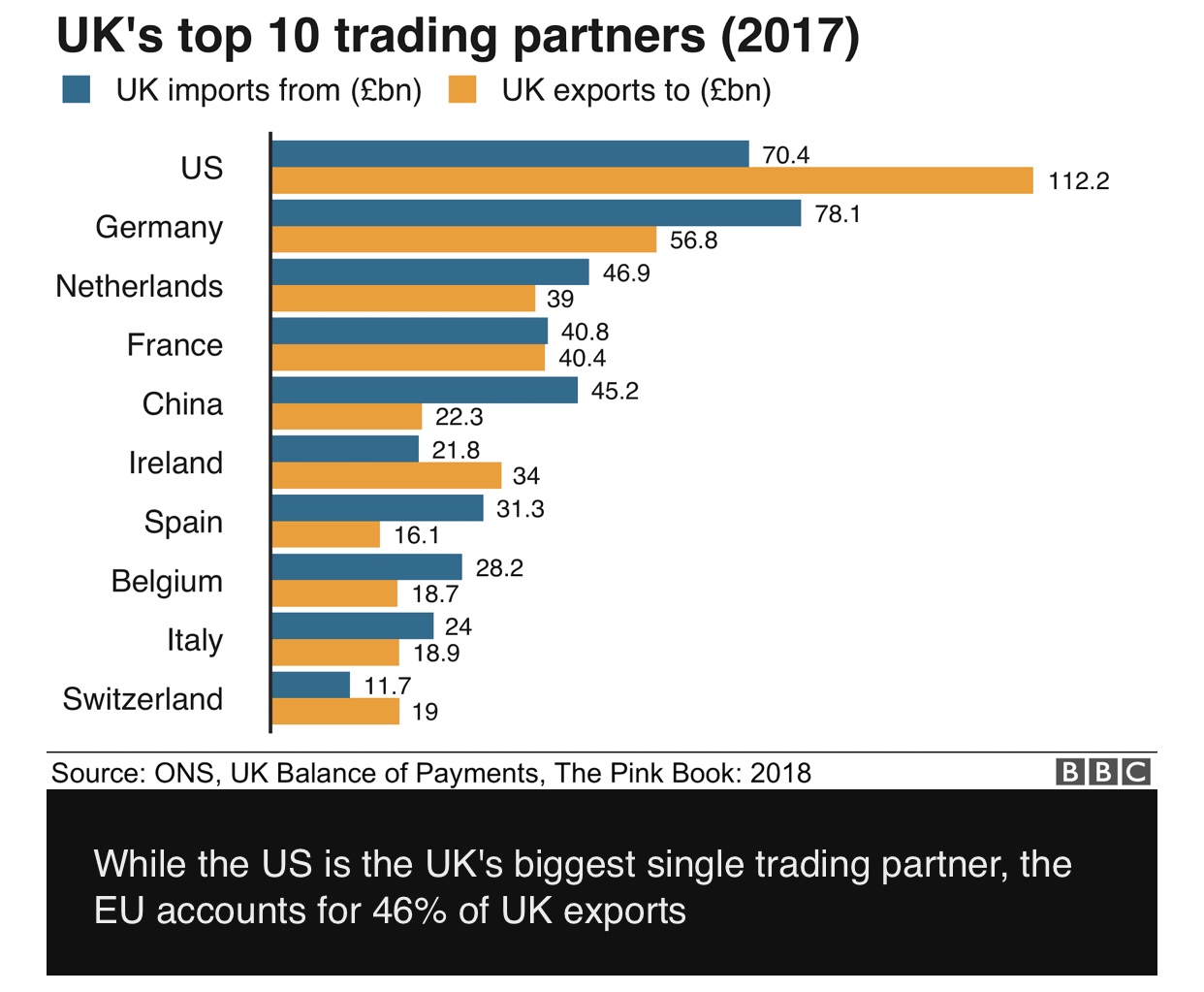
Mutual recognition agreements
The UK has also signed deals with the United States , Australia and New Zealand, but these are “mutual recognition agreements” and not free trade agreements.
The Australia and New Zealand deal replicates all aspects of the current EU agreements when it comes to recognising product standards, such as the labelling and certifying of wine.
The US agreement will, according to the Department for International Trade, particularly benefit the pharmaceutical sector which accounts for around £7.7bn of UK exports to the US – about 18% of the total.
Source: BBC
On Thursday my club Malmö FF played Dynamo Kiev at home in the UEFA Europa League.

It was also the final career home game of our Captain and best player ever – Markus Rosenberg.

Rosenberg is an institution in Malmö FF. He stated tonplay at the age of 5 on the training grounds that was located where our new statdium is located today.
After playing his younger days in our club he went on to a career abroad in Netherlands (Ajax), Germany (Werder Bremen), Spain (Racing Santander) and England (West Brom).
Five years ago he came back to our club and the rest is history. He became our capain. The best we ever had.
Three league titles, two Champions League group round and two Europa Legaue successes later – leading our team to victories towards Besiktas, Olympiacos, Shaktar Donethsk – he is now ending his career at the age of 37.
We love him. Amazing captain, fantastic player and wonderful person.
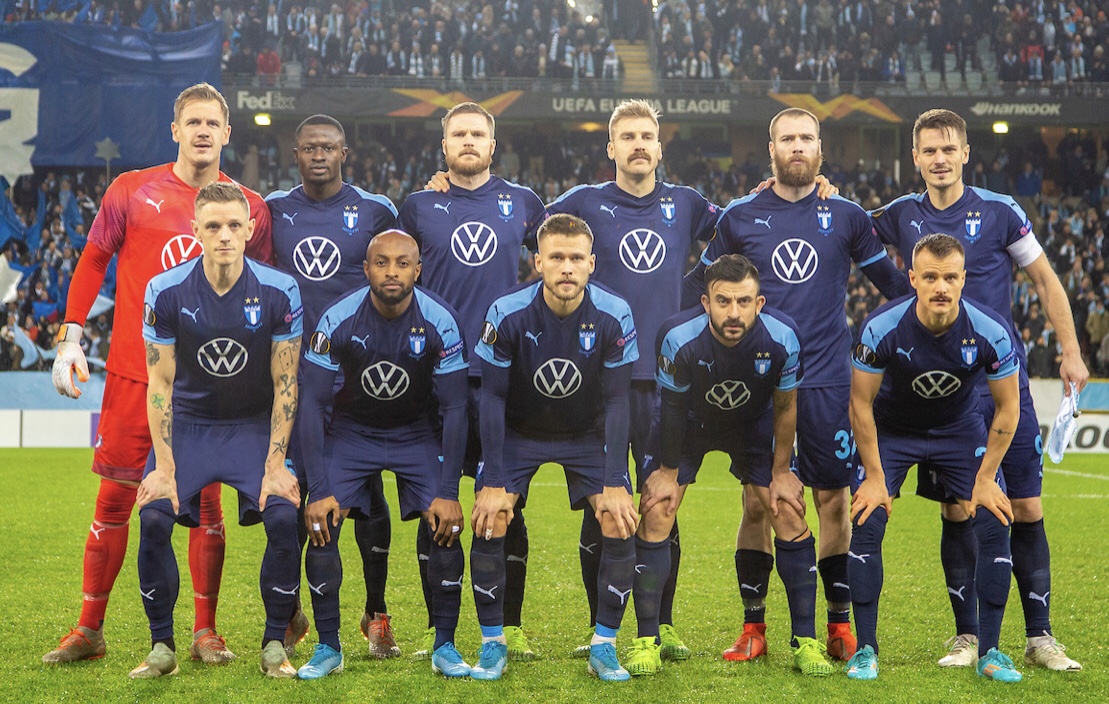
In the UEFA Europa League this season we play Dynamo Kiev, FC Copenhagen and Lausanne in the group round. Dynamo, Colenhagen and Malmö FF is competing in the lead of the group.
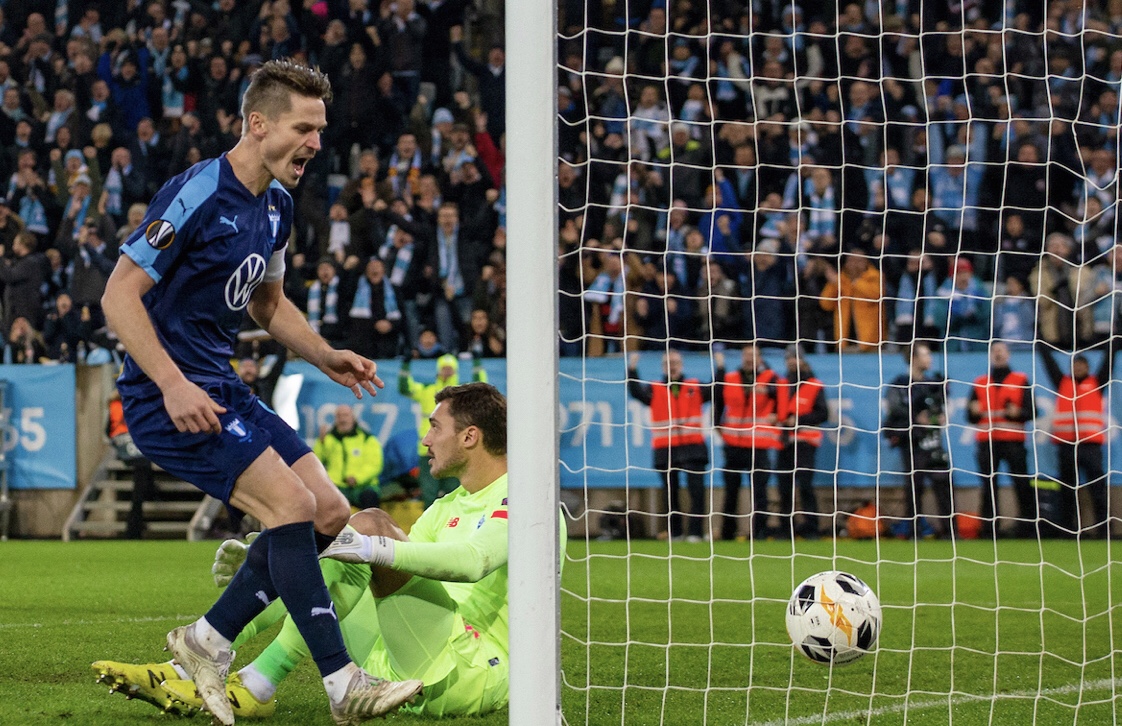
Malmö got a dream start at home with Dynamo Kiev when Rasmus Bengtsson pushed in a return to 1-0 already after two minutes.
Dynamo Kiev scored twice in the first half. It was 1-2 at halftime.

In the beginning of second half, Marcus Rosenberg scored to 2-2.
Then another Malmö player from our own ranks, Erdal Rakip scored a brilliant goal to 3-2.
After a red card on a Dynamo player they still managed to equalize to 3-3 and this seemd to become the final result.
But the hero of the day, captain Markus Rosenberg decided the match in the 95th minute – in his last match before the home supporters at Stadion.

Here he is after his extra time goal celebrating on the stands with the ultras crowd.

It was a fantastic evening at our sold-out statdium in front of an exited crowd. The spirit was electric.

I was there with my son. And after the game the club celebrated Rosenberg with an hour of tribute in front of the crowd that all stayed on until after midnight.
One of the best live sports experiences I ever had. A magic night.
There is eleven days to the UK General Election. This election has become a Brexot election that even from theboutside could be seen as a second Brexit referendum.
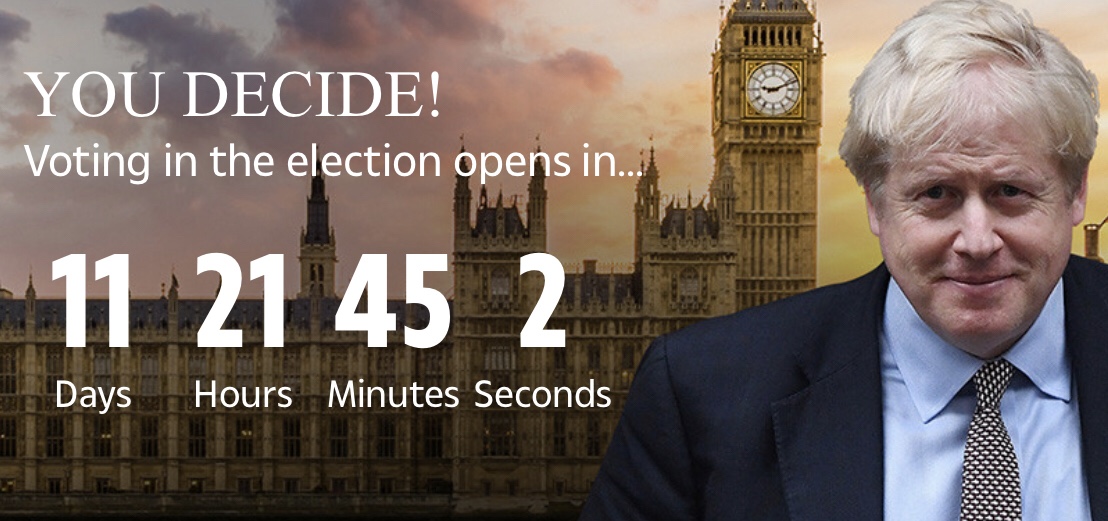
Prime Minister Boris Johnson has succeeded in making this election about “let’s get Brexit done”. Will he succceed in getting a Parliament majority or not?
One thing is clear, if he does win the election then the Wothdrawal Agreement Bill (WAB) will be voted through the House of Commons before the holiday season and UK will leave the Euroepan Union on 31 January.






You must be logged in to post a comment.